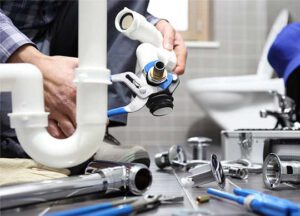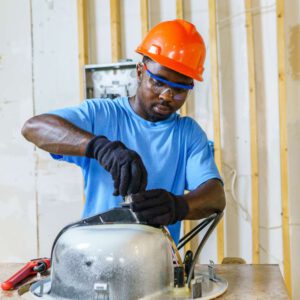Plumbing is a system that brings clean, safe drinking water into homes and removes waste. It is considered a critical component of the health and well-being of people worldwide.

Plumbing offers a wide variety of opportunities for career growth and financial security. Whether you are looking for job stability or entrepreneurship, here are five reasons to consider plumbing as your next career. Visit Website for more details.
The plumbing industry is booming, and there are plenty of opportunities to get into the field. With baby boomers retiring and a shortage of skilled tradespeople, there’s never been a better time to jump into the plumbing game.
Unlike some other careers, plumbers can enter the industry without having to pay tens of thousands of dollars in student loans. Instead, aspiring plumbers can attend vocational school or community college and learn the trade while being paid to do so. They can also participate in an apprenticeship program, where they can learn from experienced plumbers while getting paid to work and gaining experience in the field.
Once qualified, plumbers can choose to work for a plumbing company or they can start their own businesses. Both options offer a great deal of flexibility and freedom, with the former offering more stability and security while the latter can allow plumbers to work when and where they want.
If you’re looking for a career with plenty of variety, plumbing is the way to go. There are countless challenges to overcome on a daily basis, from fixing broken hot water tanks to unblocking drains and more. It’s not uncommon for plumbers to be on an “on-call” schedule, meaning they must be available to take emergency calls at any time of day or night.
Plumbing is a hands-on job, and it requires manual dexterity and coordination along with analytical thinking and problem-solving skills. It’s the perfect career for people who enjoy working with their hands and are good at math and science.
One of the best things about being a plumber is the sense of satisfaction that comes with helping people when they need it most. Whether it’s an elderly person who can’t use their shower, or a family whose basement has flooded, there’s nothing like being able to come to the rescue and fix the situation. The gratitude and appreciation that plumbers receive from their clients is truly unmatched. It’s the reason why many plumbers choose to continue their career after they reach retirement age. The benefits of being a plumber far outweigh the downsides.
You’ll Never Have to Pay a Plumber Bill Again
As you may already know, plumbing involves the distribution of water and other liquids as well as the removal of waste in residential, commercial, and industrial settings. This includes everything from faucets and toilets to water heaters and water filtration systems. A plumber is responsible for ensuring these systems are properly installed and functioning, allowing for an adequate supply of clean drinking water as well as proper waste disposal.
However, there are some plumbers out there that will try to rip you off and make things worse than they need to be. This is why you must be careful when choosing a plumber. You should always read online reviews and ask for recommendations from friends and family members before hiring someone to do work at your home or business. You should also be sure to clarify any specifications that you have with the plumber so there are no surprises down the road.
If you feel like you are being ripped off by a plumber, it is important to keep accurate records of all agreements, communications, and photos. This will help you in case you decide to file a small claims lawsuit against the plumber. If you go this route, you should only do so if you have proof that the plumber was overcharging for their services.
When you have a dispute with your plumber, you should be willing to compromise and come up with a solution that is agreeable to both parties. This will help avoid a potentially lengthy and expensive court battle. However, if you are absolutely certain that you have been ripped off by your plumber, then it is best to simply withhold payment until the issue has been resolved to your satisfaction.
You’ll Get to Meet New People
Plumbing is an incredibly diverse career path. You’ll meet people from all walks of life, from home owners to local business owners. Whether you’re installing low-flush toilets or tankless water heaters, you’ll be helping people make their lives better. This is especially rewarding for plumbers who care about their customers and strive to provide the best service possible.
Many plumbers are independent contractors, and they spend a lot of time marketing themselves in their local communities. One great way to do this is by using social media. Posting answers to common plumbing questions shows your expertise and can drive traffic to your website. Posting case studies of your work can also help you get new clients. In addition, don’t forget to post milestones like company anniversaries or awards.
It’s also a good idea to reach out to property managers. Most will have a list of trusted plumbing contractors that they use for their properties, and getting on this list can help you land a steady stream of work.
If you’re looking for a stable and fulfilling career, plumbing may be the right choice for you. Unlike other jobs that require a college degree and tens of thousands in student debt, you can train to become a plumber at vocational school or community college for a fraction of the cost and start earning money as an apprentice while you learn your trade.
Then, once you’re a licensed plumber, you can choose to work for yourself or for a large plumbing company that offers benefits like health insurance and pensions. You can still earn a high salary while working to your full potential and providing a valuable service for your customers. Just be sure to consider the pros and cons of each before you decide which option is best for you.
You’ll Be Solving Real-World Problems
Plumbing is the system that brings clean water into your home and removes waste. It’s the essential service that keeps people from getting sick due to contaminated water or untreated sewage. It’s no wonder that many consider it a critical part of public health, along with sanitation and nutrition.
Plumbing requires an attention to detail that comes from excellent observation skills and good listening. It’s a job that demands physical strength, as you need to be able to lift heavy tools and parts. It also requires analytical thinking, as you need to be able to weigh different options and choose the best solution for each situation.
Plumbers also need good customer service skills to build a solid reputation and attract new clients. A friendly smile and helpful attitude can go a long way with customers. Being able to respond quickly to queries and concerns is important, too. If you have the ability to understand what a customer is saying and explain complicated technical issues in an easy-to-understand manner, you’ll be well on your way to becoming a great plumber!
The plumbing industry is booming, and the job outlook is very good. With more and more people choosing to live in apartments and smaller houses, the demand for plumbers is on the rise. This means that now is the perfect time to start looking into a career in plumbing!
So, if you’re interested in learning a trade that’ll open up many doors, then plumbing could be the right choice. But before you make the leap, be sure to do your research. Check out the reviews of plumbing companies in your area, and see what other people have to say about them. Also, try to find out if they’re members of any local business organizations – these types of companies are usually held to high standards and can be trusted.




